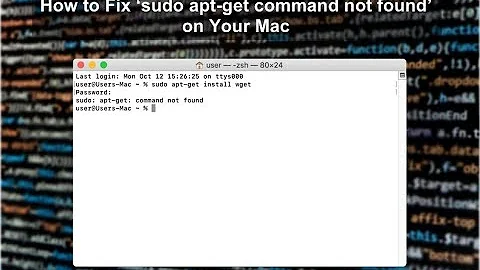"sudo: port: command not found" after installing MacPorts on Snow leopard
Solution 1
It is probably a PATH issue.
By default port is installed the directory /opt/local/bin. Add the path 'opt/local/bin' as an extra line to the plain text file /etc/paths and you should be good.
Solution 2
You can also add the following line to your ~/.bash_profile:
export PATH=$PATH:/opt/local/bin
This will add /opt/local/bin to the executable path and make your port command available to the shell.
Solution 3
open a terminal, then write:
sudo nano /etc/paths
write your password
then copy and paste in to the bottom:
/opt/local/bin
save the file:
alt + x and then y
Restart the computer.
Solution 4
this is working for me:
first open this file with nano
sudo nano ~/.bash_profile
if it doesnt exist create it manually or with
touch ~/.bash_profile
add this line to the file
export PATH=$PATH:/opt/local/bin
now reload .bash_profile
source ~/.bash_profile
Related videos on Youtube
Salesforce Beginner
Updated on September 18, 2022Comments
-
Salesforce Beginner over 1 year
I have attempted to install MacPorts in order to upgrade my Rails version so that I can work my way through Agile Web Development with Rails, PragProg (4th, 2011). I have followed the directions in the book, as well as on the MacPorts web site, to perform the install from disk image. It appeared to install correctly, however, running port commands afterwards returned "port: command not found".
I searched Stack Exchange and found this question, so I attempted to install from the command line using "tar xjvf MacPorts-1.9.2.tar.bz2". Again, the install seems to work. I receive the confirmation that MacPorts installed successfully, but I still receive "sudo: port: command not found" error on trying to selfupdate MacPorts (via "sudo port -v selfupdate").
I think that my error lies in not having the correct path set. I followed the advice in this thread, namely, adding a path (/opt/local) in paths.d, but I still get the error.
If it matters, terminal is set to open shells with default login shell (/usr/bin/login). Should I change this to /bin/bash?
So, is this a MacPorts issue, a $PATH issue, or a StupidUser issue?
-
CoDe over 10 yearsI created .bash_profile and added export PATH=$PATH:/opt/local/bin export MANPATH=$MANPATH:/opt/local/share/man export INFOPATH=$INFOPATH:/opt/local/share/info lines...but still it's giving me same problem..i am using OS version 10.8.3 .any suggestion?
-
 Baldráni over 7 yearsI'll just add that you have to restart your computer.
Baldráni over 7 yearsI'll just add that you have to restart your computer. -
 markroxor over 5 years@Baldráni no need to restart. Try -
markroxor over 5 years@Baldráni no need to restart. Try -source ~/.bash_profile




